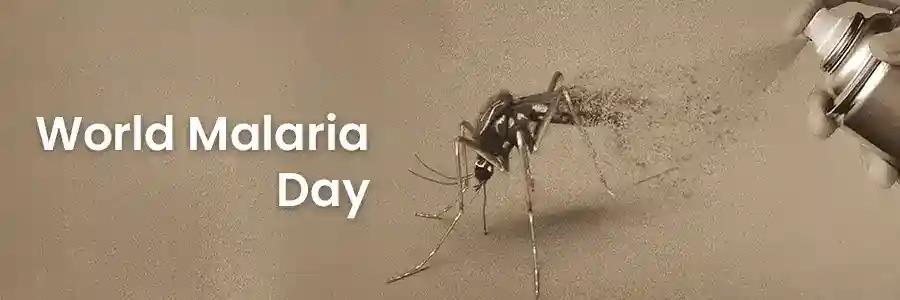- Cardiology 84
- Dermatology 45
- Endocrinology 33
- ENT 16
- Fertility 190
- Gastroenterology 78
- General-Medicine 81
- Gynecology 80
- Hematology 19
- Infectious-Diseases 33
- Neurology 52
- Oncology 34
- Ophthalmology 23
- Orthopedics 69
- Pediatrics 31
- Procedure 23
- Public-Health 144
- Pulmonology 59
- Radiology 8
- Urology 68
- Wellness 161
- Woman-and-child 77

World Malaria Day
World Malaria Day is observed on April 25th annually to raise awareness about the disease, prevention, and control. Malaria is a mosquito-borne disease caused by Plasmodium parasites mostly found in many tropical and subtropical countries.
Secure your health with a second opinion. Make informed decisions and book your appointment today!
Get A Second OpinionHistory
Drinking enough water is essential during pregnancy, but it becomes even more important during hot weather. Dehydration can cause dizziness, headaches, and nausea, which can harm the fetus and the mother. So expectant mothers should drink at least 8-10 glasses of water in 24 hours to keep themselves hydrated.
Many health organizations and business people across the globe will unite on this day with a common goal of eliminating malaria worldwide, especially in tropical countries.
Important Facts About Malaria
- Malaria is a severe and sometimes deadly disease caused by a parasite that mainly infects a certain kind of mosquito that feeds on man.
- Plasmodium falciparum is the most common malarial parasite and the leading cause of malaria-related fatalities worldwide.
- Malaria is often a fatal febrile disease with fever, headache and shaking chills as primary signs of illness.
- Also, malaria is treatable and highly preventable in the early stages.
- To diagnose malaria, doctors evaluate the patient's medical history, perform a physical exam, and ask for blood tests to confirm the presence of the parasite, identify the type of parasite, and detect any medication resistance or complications.
- Malaria is treated with prescription medications that differ depending on the parasite type, severity of symptoms, age, and pregnancy status.
Malaria Control: Progress and Challenges
Progress in Malaria Control
- Over the past decade, malaria control interventions have significantly reduced cases and fatalities.
- Critical measures include the use of insect repellents, and mosquito nets, spraying insecticides or repellents on clothing, and wearing long-sleeved clothing and long pants.
Emerging Challenges
- The emergence of drug-resistant parasites and insecticide-resistant mosquitoes threatens the progress made in malaria control.
Required Investments
- Sustained investment in research and development is essential to develop new drugs, vaccines, and diagnostic tools effective against drug-resistant parasites and insecticide-resistant mosquitoes.
- Improving access to existing tools and technologies, especially in hard-to-reach areas, is crucial.
Political Commitment and Collaboration
- Sustained political commitment, community engagement, and multi-sectoral collaboration are necessary for effective and sustainable malaria control.
- Governments, civil society organizations, and stakeholders must work together to strengthen health systems, improve healthcare access, and ensure effective implementation of malaria control interventions.
Community Engagement
- Community engagement is critical for malaria control, empowering communities to take ownership and actively participate in interventions.
- Community-based approaches, such as involving community health workers and leaders, have proven effective in improving healthcare access and increasing the uptake of malaria control measures.
Ready to take control of your health journey? Book your appointment now and start your path towards wellness today!
Book an AppointmentConclusion
World Malaria Day raises awareness about malaria's burden, progress, and remaining challenges. The theme of World Malaria Day emphasizes the need for sustained investment in developing new tools and technologies, strengthening healthcare systems, and engaging communities. Investing in malaria control can end malaria for good and contribute to a healthier nation.
Frequently Asked Questions
Every year on April 25, the world observes World Malaria Day to advocate efforts to prevent and manage the disease and to increase awareness of malaria.
It raises awareness about the global impact of malaria, encourages political commitment to malaria prevention and treatment, and showcases progress made in combating the disease.
For World Malaria Day in 2023, the theme is "Zero Malaria Starts with Me," highlighting both individual and group efforts to stop malaria.
Eliminating malaria improves health outcomes, reduces poverty, and promotes economic development in affected communities.
Technology can aid in mapping malaria transmission, tracking outbreaks, developing new treatments, and improving access to healthcare in remote areas.

- Cardiology 2132
- Dermatology 168
- Endocrinology 135
- ENT 97
- Fertility 217
- Gastroenterology 232
- General 478
- General-Medicine 1685
- Gynecology 169
- Hematology 85
- Infectious-Diseases 208
- Neurology 207
- Oncology 345
- Ophthalmology 65
- Orthopedics 187
- Pediatrics 83
- Procedure 72
- Public-Health 209
- Pulmonology 126
- Radiology 13
- Second Opinion 311
- Urology 294
- Wellness 600
- Woman-and-child 447
Related Blogs
If you have any questions, please fill out the enquiry form or call us, and we will get back to you promptly.
040-68334455